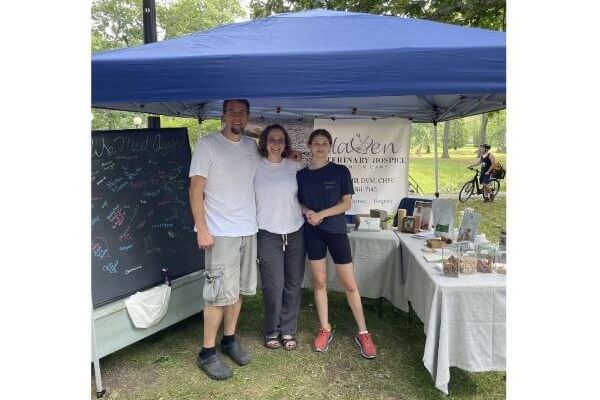Local Spotlight: Kelly Hill
 |
|
Kelly Hill, DVM, center, and her husband, Matt Hill, with their daughter Story Hill.
|
Veterinarian Kelly Hill has lived in many places – among them North Carolina, Missouri and Illinois. But after being in the Pine Tree State for 25 years and working and residing in Biddeford – a city she loves – Hill has claimed Maine as her home.
Hill’s background in veterinary medicine is just as far-reaching as the places she’s lived. She earned her undergraduate degree from Davidson College in North Carolina and her doctorate at the University of Illinois College of Veterinary Medicine. Hill completed her small animal internship in Missouri and her surgical internship in Florida. She spent 16 years in emergency vet medicine, mostly in Maine.
In 2018, Hill founded Haven Hospice and Veterinary Care at 6 Pomerleau St., suite 102, in Biddeford. From there she implemented Tranquil Waters, a crematory process that uses water instead of flames. Hill said aquamation, also known as hydrolysis, is legal in all 50 states.
According to “An Eco-Friendly Ending” by Jen Reeder, the process was spotlighted in 2021 when Desmond Tutu elected to use aquamation, which is much more environmentally friendly, for himself. It has fascinating applications besides.
Both you and your husband, Matt Hill, are passionate about environmental sustainability. What was the catalyst for you?
It’s incredibly important. It’s why I started Tranquil Waters. Cremation is not environmentally friendly. I have three little girls and I want my great, great, great grandkids to have an environment with plants and trees.
I didn’t know about aquamation until I stated hospice training. (She is a certified hospice and palliative care veterinarian.) It’s been available for humans in Maine, but not animals.
Tell us more about Tranquil Waters
My husband and I founded Tranquil Waters about three years ago during COVID. It wasn’t the best time to start a business. We’d been working on our business plan for years, but it’s a passion project. From my training I’m finding out a gentler and better way; the family animal stays in my care.
Can explain the aquamation process?
It’s a trend – environmentally responsible aftercare for pets. A green alternative to flame cremation. It simulates an earth burial. Simply put, it is warm water flow and alkaline water that reduces the body to the bone, with 20-30 percent of bone left. Very gentle washing over the body. The bones are put in a machine called a cremulator and pulverized into “ash.”
They (clients) love that idea – it’s earth friendly and they get more of their loved one back.
There are no carcinogens and even the water is recycled. In Colorado, Be A Tree uses aquamation on humans. The water is nutrient-dense and fertilizes an orchard.
There is the potential for the salt used to neutralize PFAs. Potentially there are other uses; it’s very restorative and earth friendly. What if we water the land for very enriched soil? Not yet, but there’s a potential benefit. It’s how to decrease the footprint in everything we do.
How does the specialized software that tracks animals work?
When an angel – we call them angels – are entered into the software it gets tagged with a QR code. Everything is matched so we know where everyone is. Also the memorials. Everything we do is so important. There’s lots of moving parts and lots of checks along the way.
How has veterinary care changed during your career?
It’s become very corporate, unfortunately. Private equity firms own the majority of hospitals in Maine. Vets used to own their hospitals.
Do you have pets?
Three dogs and seven cats, including Dolly, our blind office cat; nine chickens and a Guinea hen that just showed up one day.
What’s the most unusual animal you’ve treated?
A wallaby as an emergency vet in Northern Maine. It ingested some leaves that were neurologic; I had to hold them by their tail. It was really, really nerve wracking. In Atlanta I did tons of exotics.
Ann Fisher is a freelance journalist based in Saco. She can be reached at 432-7483.

